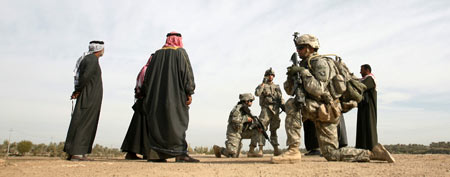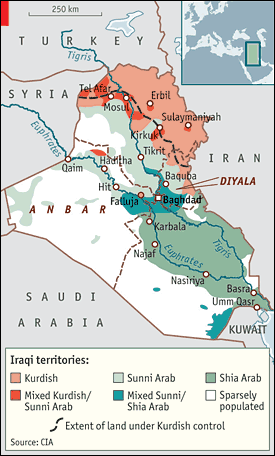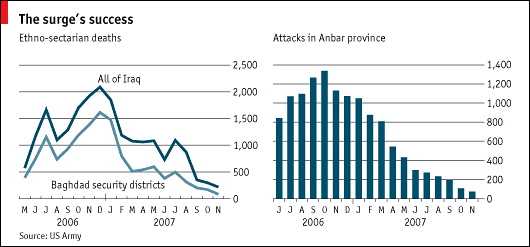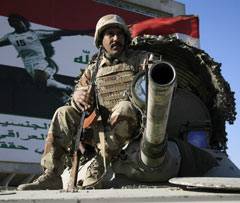
December 13th 2007 | BAGHDAD, BASRA AND FALLUJA
The surge of American troops has dramatically reduced violence. But Iraq's politicians may still squander an obvious chance for reconciliation

AFTER more than three years as an interpreter for American troops in the city of Falluja, Dave (not his real name) recently had his hair cut for the first time by a local barber. Since then, several American marines based inside the city of some 300,000 people have also had their crew-cut domes locally shaved to a gleam. Six months ago they would have had their throats slit��"and so, almost certainly, would the barber.
But times have changed dramatically. Once widely considered the most dangerous and xenophobic city in Iraq and one of the country's most resilient havens of al-Qaeda, Falluja is now enjoying a new, if tentative, peace. So, no less strikingly, is the whole of Anbar province, in which Falluja lies, and most of the Euphrates river valley. The Americans say that if you go north and north-west through Hit and Haditha and up to the border with Syria near the town of Qaim, it is clear that al-Qaeda has been chased out��"with the co-operation of the local Sunnis and the tribal leaders. In those areas, which embrace the vast majority of Iraq's Sunni Arabs outside Baghdad, attacks against the American-led coalition forces have dropped more than tenfold compared with a year ago.
The peace in Falluja is fragile, as it is in the Sunni parts elsewhere. There is no knowing what would happen if the Americans left in a hurry. It is unclear whether al-Qaeda in Iraq (known in Western military circles as AQI) has been truly defeated or is biding its time. Nor is it certain that the local Sunni tribal leaders who have struck security deals with the Americans across Anbar province would, if the Americans left, make war or peace with the Shia-dominated government in Baghdad.
But however temporary it may prove to be, it is an extraordinary change. In the precinct of Nazal��"one of Falluja's nine, each with a joint American-cum-Iraqi police station��"locals watch warily as a dozen helmeted young American marines, their guns pointed at the ground, tramp slowly past, avoiding puddles of sewage and piles of rubbish (much favoured by insurgents as a place for planting roadside bombs), and smiling at the knots of ragged children who shout “Chocola, meester” and are sometimes given pencils instead.

After every ten steps or so, the marines swivel round and walk backwards, giving themselves a maximum field of vision. A couple of local Iraqi volunteers, clad in blue jeans and without helmets, accompany the patrol. Locals politely exchange salaams; veiled women with babes in arms retreat hastily behind high metal doors. But the marines say the mood has been transformed. No marine has been killed in Falluja since the summer's surge. The patrol stops from time to time as its leader, a fresh-faced corporal from Chicago, engages passers-by, via Dave, the newly coiffed interpreter from Baghdad, in amiably stilted badinage. A boy is asked about football. A shopkeeper talks about his oranges, and how business is only slowly improving. The Shia-led government in Baghdad, it is plainly believed, is loth to give much help to the Fallujans, with their reputation for Sunni extremism.
After the Americans' ten-day attack on Falluja in November 2004, much of the city was a mess of rubble; despite a spate of building that started in the summer, also thanks to the surge, the marks of destruction are still visible everywhere. At least 1,500 Islamist militants, most of them members of AQI, many of them foreign, were said to have been killed in the siege, but until this spring the city remained a smouldering hub of insurgency.
The turning point, apparently, was the al-Qaeda suicide-bombing of a policeman's funeral in May, when at least 27 locals were killed. Suddenly, it seems, the people began to react against al-Qaeda's excesses��"the enforcement of strict dress codes, the banning of music, even (it is said) the cutting off of smokers' fingers��"and were ready to endorse the local sheikhs' deals with the American army, even though it had pulverised their city.
Falluja is still not back to normal. A curfew remains in force. Just five entry points, guarded by American soldiers alongside Iraqi police, oversee access into the city. Each precinct is like a gated community. Every car must have an identity badge to be let in. Even so, a bombmaker occasionally gets through. “They're waiting and watching,” says an American lieutenant.
Moreover, the rest of Iraq, like Falluja, is still far more dangerous for Americans and other foreigners than it was in the first few months after the invasion of 2003, before the insurgency got going. The entire nerve-centre of the American administration, staffed by some 10,000 people, remains walled off in Baghdad's so-called “green zone”. Few foreign diplomats get out and about. Western journalists use a web of Iraqi reporters, but their movements are still restricted. Several of Baghdad's best-known streets remain off-limits to traffic.
However, it is clear that the al-Qaeda part of the insurgency, which is manned almost entirely by Iraqis though its suicide-bombers and its strategists may still be foreign, has been hard hit. Although in November more than 20 civilians were killed on an average day, mainly by sectarian violence, that is far less than the toll a year ago, when the discovery of as many as 100 corpses at dawn was not unusual. An independent website, icasualties.org, while admitting that Iraqi civilian deaths are hard to count, puts the figure of Iraqi security forces and civilians killed in November at around 560, compared with more than 3,000 last February. American military deaths since October are less than a third of the figure a year ago.
All the indicators suggest that violence has subsided sharply nearly everywhere, not just in Anbar, but also in Baghdad. The border crossing to Syria near Qaim has opened after several years' closure. The oil pipeline from Kirkuk, which goes north into Turkey and should carry more than a fifth of Iraq's oil exports, has been flowing almost without a break for the first time in years; in 2006, it was open for barely 40 days. “We are close to a sustainable level of violence,” says the overall commander of the American-led forces, General David Petraeus. He means that fears of a murderous sectarian meltdown have receded, though he gives constant warning that things could slip back again.
Meanwhile, the Shia heartlands around Karbala and Najaf have been quiet since a bloody bout of intra-Shia sectarian violence in Karbala in August. Since September, when the British left the centre of Basra, Iraq's second city, which is 95% Shia, violence there too has dipped very sharply��"and the British, now encamped at an airport outside the city, are being fired on some ten times less than before.

The Kurds are also at peace, despite the hiccup in October and November, when the Turkish army threatened to invade in force in order to clobber the Kurdistan Workers' Party (PKK), a group of Turkish-Kurdish guerrillas who use a remote and rugged strip of Iraqi Kurdistan's borderland as a haven. The exception is the disputed city of Kirkuk, where ethno-sectarian violence, mainly between Kurds and Sunni Arabs, shows no sign of abating.
But a bitter battle is still being fought upstream along the Tigris river valley and its tributaries, up to Mosul and beyond. The mixed-sect province of Diyala is probably today's bloodiest cockpit, where the Americans and their allies in the Iraqi security forces are fighting an array of Islamist and nationalist insurgents with al-Qaeda again to the fore.
The surge is by no means the sole reason for Iraq's improved security. A truce was called in August by the biggest and perhaps bravest of the Shia militias, the Mahdi Army, better known to the American-led coalition by its Arabic acronym JAM (from Jaish al-Mahdi), whose gunmen are known as JAMsters. This in turn may have helped turn Sunnis against al-Qaeda; facing fewer attacks from the Shia militias, they had less cause to embrace a ruthless Sunni protector.
But the biggest reason is probably the agreements that the Americans have struck in Anbar province with Sunni tribal leaders who have formed a group known as al-Sahwa (the Awakening). The Americans have armed some 65,000 Sunnis, with another 12,000 or so keen to sign up, in tribal battalions known in coalition-speak as “Concerned Local Citizens” (CLCs). These groups have also set up militias in some suburbs of Baghdad, mainly in the capital's west, where the Sunnis had hosted al-Qaeda with varying degrees of reluctance in the face of a sectarian onslaught. Some 12,000 Shia are also said to be poised to join CLC groups to co-operate with the Americans elsewhere.
The Americans are also freeing thousands of the 25,000-odd detainees they hold on suspicion of being insurgents (quite separately from the thousands more in Iraqi government custody). In the past few months some 3,000 have been let out, and imams have been helping to persuade those about to be freed to disavow AQI.
Yet another reason is what a senior British officer calls “a huge change in American behaviour” since the wily and thoughtful General Petraeus took up his post in January. Efforts to co-operate with local imams, to respect local culture, to hire more locals as interpreters and to increase the number of Arabic-speakers on American military and civilian staffs have borne fruit. It helps, too, that the American ambassador, Ryan Crocker, is an experienced Arabist who can also speak a bit of Farsi.

Not quite ready to take over
In Falluja, female officers are deployed to question and search women. American soldiers there almost never go into mosques. But befriending imams is now a priority. Earlier this week, one of Falluja's leading imams, Sheikh Nazar, who has been a critical ally against al-Qaeda, officiated at the opening of a revamped police station. “If we lose him, we lose the lot,” says a marine lieutenant.
It is plain that many of the CLC and tribal groups previously supported��"indeed were part of��"the national or “honourable” resistance to the occupation and have simply switched sides, seeing that, at any rate in the short run, the Americans could protect them against Shia militia depredations. But many insurgent groups apart from al-Qaeda are still fighting against the Americans and their allies. Some analysts have counted more than 75 of them. Certain prominent groups, such as the 1920 Revolutionary Brigades, named after an uprising soon after the British invented Iraq as a country, say they are simply waiting for the surge and the lull to end before erupting again. Others among these fractious bands are talking to the Americans, and may yet make peace.
What is clear, in any event, is that there is a gaping window of opportunity for economic, diplomatic and political progress. On the economic front, most development had been stymied by insecurity. Now projects are starting to go ahead. Electricity in Baghdad is on for up to 12 hours a day, against eight hours six months ago. Oil production, though still not at its pre-war level, has climbed from its trough of 1.75m barrels a day in January last year to more than 2.5m b/d today. Shops are reopening in many parts of Baghdad, and businessmen are hopeful, though foreign investors have yet to return.
On the diplomatic front there are hints of progress, too. American generals have cautiously noted an apparently greater readiness on the part of Syria to clamp down on al-Qaeda and the traffic of insurgents across its border. Iran, too, may be stanching the flow of weaponry to its Iraqi Shia militia friends. More broadly, there is a growing acceptance, both by Iraq's government and by the Americans, that political progress requires a regional framework in which Iraq's key neighbours��"Saudi Arabia, Syria, Turkey and Iran��"can play a part. The United Nations is back in greater numbers, with a high-clss envoy, Staffan de Mistura, ready to help, especially with tricky issues such as provincial polls and the question of Kirkuk.
So Iraq's politicians at last have a chance to use the breathing space provided by the surge and by the Awakening to accommodate each other. Several issues are ripe for resolution. An oil law, to divide revenue equitably while giving regions (especially the Kurdish one) some freedom to grant exploration and management contracts locally, has been in the offing for more than a year. A revised deBaathification law, to bring back officials from the Saddam Hussein era into public service, is under scrutiny, along with a pensions law to give such officials a better deal.
Perhaps most important, a provincial-elections law is under discussion. This could lead the way to new elections in the spring, enabling the newly “awakened” Sunnis of western and northern Iraq to empower themselves, especially in budget matters; last time round, in January 2005, they boycotted the elections. If they had real power in their provinces, they might drop their fierce opposition to devolution, which they have hitherto seen as a Western device to fragment their country.
Alas, there has so far been no sign that the government of Nuri al-Maliki is poised to grab this opportunity. Indeed, as an adviser to General Petraeus glumly describes it, “The politics is going nowhere.” The government still acts like a collection of competing fiefs, not a body that speaks with a national voice. Even among Shias, a paralysing factionalism has, if anything, got worse. The two principal Shia parties, Mr Maliki's Dawa and the better-organised Islamic Supreme Council of Iraq (ISCI), both fear the mass appeal of Muqtada al-Sadr, who has stayed out of government but often calls the shots on the streets.
Worse, Mr Maliki is still failing to reach out effectively to the Sunnis. The main Sunni block in parliament, which had a clutch of ministries in the ruling coalition, continues to take no part in government. Relations worsened recently when a son of Adnan al-Dulaimi, a leader of the biggest Sunni block in parliament, was arrested with some 30 of his father's personal guards on suspicion of involvement in insurgent bombings. To cap it all, the Sunnis are sorely divided too��"and not just over al-Qaeda. The main Sunni block in parliament is deeply wary of the Awakening in Anbar, which may displace it as the authentic voice of the Sunnis nationwide.
Mr Maliki himself sounds particularly hostile to the notion of the CLCs��"the mainly Sunni tribal militias��"being inducted into the security forces or civil service as part of the price of peace. The new Shia establishment hates the arming of the Sunni militias because it thinks they may one day turn their guns against the Shias.
The current edgy lull is due in large measure to a series of local deals cut between the American army (and the British army in Basra) and groups close to the insurgents, with the centrally run state thereby diminished. Indeed, it can be argued that such deals are eroding the state and its fragile institutions still more. But it may be the only way to go.
The fundamental flaw in Iraqi politics persists. The new Shia order remains loth, after centuries of oppression, to give the Sunnis a decent slice of power; and the minority Sunnis seem unable to accept second place in a devolved state. Last week a deputy prime minister, a Sunni, denied that Shias outnumber Sunni Arabs.
In his memoir of service as a British diplomat, among other places in Baghdad in the 1960s, Sir Donald Hawley characterises the Iraqis thus:
[They] are a very talented, intellectual people and have no lack of experts on many subjects. They have a tendency, however, not to agree with one another and are no strangers to violence. Late at night after several strong whiskies, they could be very frank on many subjects, including themselves, and would sometimes grow quite maudlin. We are a very bad people and very difficult to govern. Did we not kill Ali [the Prophet Muhammad's son-in-law, whom the Shias revere]? Did we not kill Hussain [his son]? Very few have successfully dominated us...Nuri Said [the pro-British prime minister, assassinated in 1958] too knew how to govern Iraq,” they would say. It is an Iraqi trait to admire strength and to respect it for the stability it can give.
Mr Maliki has a last chance to change things for the better. Iraq's battered people are yearning for their politicians to make up. But some things do not change.


